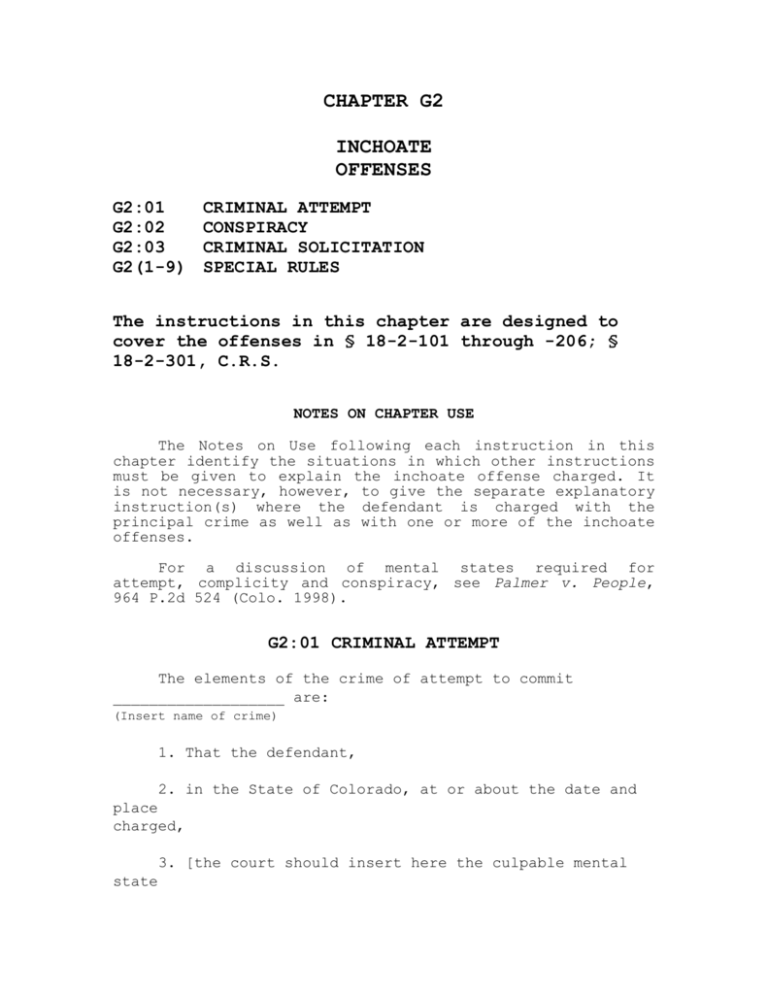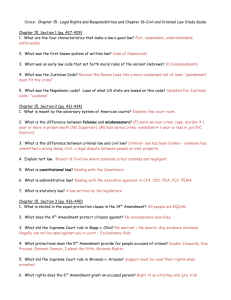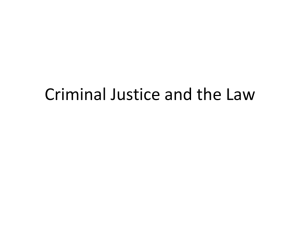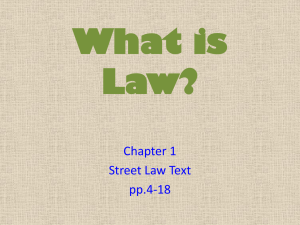Ch. G2 Inchoate Offenses
advertisement

CHAPTER G2 INCHOATE OFFENSES G2:01 G2:02 G2:03 G2(1-9) CRIMINAL ATTEMPT CONSPIRACY CRIMINAL SOLICITATION SPECIAL RULES The instructions in this chapter are designed to cover the offenses in § 18-2-101 through -206; § 18-2-301, C.R.S. NOTES ON CHAPTER USE The Notes on Use following each instruction in this chapter identify the situations in which other instructions must be given to explain the inchoate offense charged. It is not necessary, however, to give the separate explanatory instruction(s) where the defendant is charged with the principal crime as well as with one or more of the inchoate offenses. For a discussion of mental states required for attempt, complicity and conspiracy, see Palmer v. People, 964 P.2d 524 (Colo. 1998). G2:01 CRIMINAL ATTEMPT The elements of the crime of attempt to commit ___________________ are: (Insert name of crime) 1. That the defendant, 2. in the State of Colorado, at or about the date and place charged, 3. [the court should insert here the culpable mental state required for the underlying offense] 4. [engaged in conduct constituting a substantial step . toward the commission of _______________ (Insert name of crime) A substantial step is any conduct, whether act, omission or possession, which is strongly corroborative of the firmness of the actor’s purpose to complete the commission of the offense.] 5. [without number _____.] the affirmative defense in instruction After considering all the evidence, if you decide the prosecution has proven each of the elements beyond a reasonable doubt, you should find the defendant guilty of criminal attempt to commit (insert name offense). After considering all the evidence, if you decide the prosecution has failed to prove any one or more of the elements beyond a reasonable doubt, you should find the defendant not guilty of criminal attempt to commit (insert name of offense). NOTES ON USE Delete inapplicable bracketed material. Where the defendant is charged with criminal attempt, an instruction explaining the elements and culpable mental states of the principal crime must be given. For discussion of mens rea, see People v. Thomas, 729 P.2d 972 (Colo.1986); Bogdanov v. People, 941 P.2d 247 (Colo. 1997) amended, 955 P.2d 997 (Colo. 1997),disapproved of on other grounds by Griego v. People,19 P.3d 1 (Colo. 2001); People v. Beatty, 80 P.3d 847 (Colo. App. 2003). For discussion of substantial Lehnert, 163 P.3d 1111 (Colo. 2007). step, see: People v. SOURCE & AUTHORITY §18-2-101, C.R.S. CLASSIFICATION OF OFFENSE If If If If If If If attempt attempt attempt attempt attempt attempt attempt object object object object object object object is is is is is is is F1, F2, F3, F4, F5, F6, M1, then then then then then then then F2 F3 F4 F5 F6 F6 M2 G2:02 CONSPIRACY The elements of the crime of conspiracy are: 1. That the defendant. 2. in the State of Colorado, at or about the date and place charged, 3. with the intent to promote or commission of the crime of (insert principal crime) 4. or one or more (insert (insert facilitate the [agreed with another person or persons that they, of them, would engage in conduct which constitutes name of principal crime) or an attempt to commit name of principal crime), and] -or- [agreed to aid another person or persons in the planning or commission of (insert principal crime), and] 5. the defendant, or a person with whom the defendant conspired, has performed an overt act in pursuance of such conspiracy. 6. [without the affirmative defense in instruction number . “Overt Act” means any act knowingly committed by one of the conspirators, in an effort to accomplish some object or purpose of the conspiracy. The overt act need not be criminal in nature if committed separately and apart from the conspiracy. It must, however, be an act that tends to accomplish the plan or scheme, and must be knowingly done in furtherance of some object or purpose of the conspiracy charged in the information [indictment]. After considering all the evidence, if you decide the prosecution has proven each of the elements beyond a reasonable doubt, you should find the defendant guilty of conspiracy. After considering all the evidence, if you decide the prosecution has failed to prove any one or more of the elements beyond a reasonable doubt, you should find the defendant not guilty of conspiracy. NOTES ON USE Delete inapplicable bracketed material. Where the defendant is charged with conspiracy, an instruction explaining the elements and definitions of the principal crime must be given. If a person conspires to commit a number of crimes, he is guilty of only one conspiracy so long as such multiple crimes are part of a single criminal episode. SOURCE & AUTHORITY §18-2-201,-206, C.R.S. CLASSIFICATION OF OFFENSE F6, for any felony M3, for any misdemeanor G2:03 CRIMINAL SOLICITATION The elements of the crime of criminal solicitation are: 1. That the defendant, 2. in the State of Colorado, at or about the date and place charged, 3. with intent to promote or facilitate the commission of _____________ , (insert felony) 4. under circumstances strongly corroborative of that intent, 5. [commanded, induced, entreated, or otherwise attempted to persuade another person,] -or[offered his/her services or another’s services to a third party,] 6. to commit _________________ , (insert felony) 7. [without the affirmative defense in instruction number .] After considering all the evidence, if you decide the prosecution has proven each of the elements beyond a reasonable doubt, you should find the defendant guilty of criminal solicitation. After considering all the evidence, if you decide the prosecution has failed to prove any one or more of the elements beyond a reasonable doubt, you should find the defendant not guilty of criminal solicitation. NOTES ON USE When the prosecution relies on a complicity theory, the instruction defining complicity must be given. Where the defendant is charged with solicitation, an instruction explaining the elements of and definitions for the principal crime must be given. Melina v. People, 161 P.3d 633(Colo. 2007)(discussing statutory requirements and when unanimity instruction required) SOURCE & AUTHORITY §18-2-301 (1),(5), C.R.S. SPECIAL RULES G2(1) CONSPIRACY—MULTIPLE CONSPIRATORS If the defendant knows that one with whom he conspires to commit a crime has conspired with another person or persons to commit the same crime, he is guilty with such other person or persons whether or not he knows their identity. [§18-2-201(3), C.R.S.] G2(2) CONSPIRACY—NO DEFENSE It is no defense to a charge of conspiracy that the defendant or the person with whom he conspires does not occupy a particular position or have a particular characteristic which is an element of the crime, so long as the defendant believes that one of them does. [§18-2-205, C.R.S.] G2(3) CONSPIRACY—NO DEFENSE It is no defense to a charge of conspiracy that the person with whom the defendant conspires [is not legally responsible] [has immunity to prosecution or conviction] for the commission of the crime. [§18-2-205, C.R.S.] G2(4) CRIMINAL ATTEMPT—COMPLICITY NO DEFENSE A person who engages in conduct intending to aid another to commit an offense, commits criminal attempt if his conduct would establish him as a principal were the offense committed by the other person, even if the other person is not guilty of committing or attempting the offense. [§18-2-101(2), C.R.S.] G2(5) CRIMINAL ATTEMPT—NO DEFENSE Factual or legal impossibility of committing criminal attempt is not a defense if the offense could have been committed had the attendant circumstances been as the defendant believed them to be. [§18-2-101(1), C.R.S.] G2(6) CRIMINAL ATTEMPT—NO DEFENSE It is no defense to the charge of criminal attempt that the crime attempted was actually completed by the defendant. [§18-2-101(1), C.R.S.] G2(7) CRIMINAL SOLICITATION—NO DEFENSE It is no defense to the charge of criminal solicitation that the person solicited could not be guilty of the offense because of lack of culpability or legal responsibility, or other incapacity. [§18-2-301(3), C.R.S.] G2(8) REUNIFICATION AND ABANDONMENT-NONAVAILABILITY Renunciation and abandonment are not voluntary and complete so as to be a defense to a charge of [criminal attempt] [conspiracy] [criminal solicitation] if they are motivated in whole or in part by a belief that a circumstance exists which increases the probability of detection or apprehension of the defendant or another, or which makes more difficult the consummation of the crime. [§18-2-401(1)(a), C.R.S.] G2(9) REUNIFICATION AND ABANDONMENT-NONAVAILABILITY Renunciation and abandonment are not voluntary and complete so as to be a defense to a charge of [criminal attempt] [conspiracy] [criminal solicitation] if they are motivated in whole or in part by a decision to postpone the crime until another time or to substitute another victim or another but similar objective. [§18-2-401(1)(b), C.R.S.]








